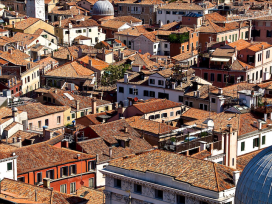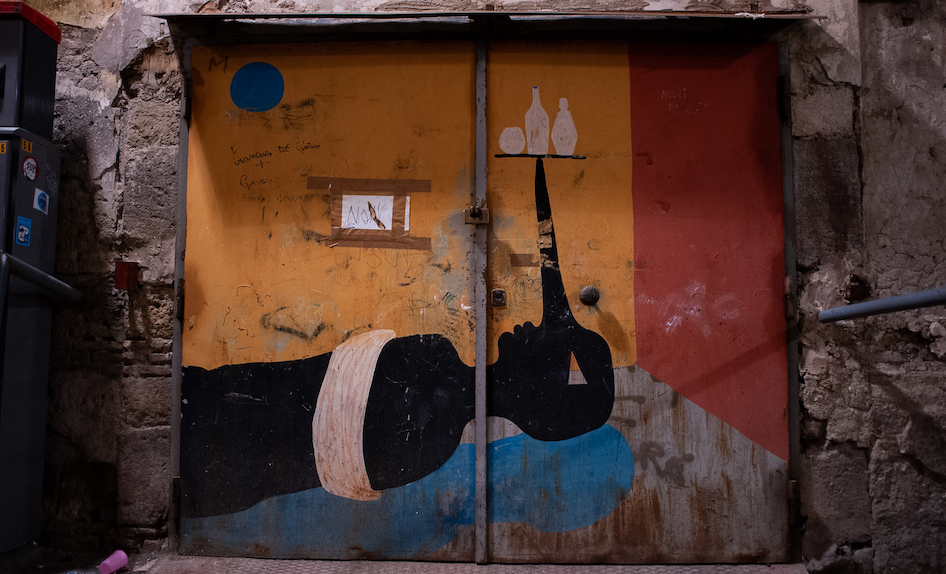
Venetian apartments lie empty: the city’s short-term holiday rental market is pushing out local residents. Can campaign groups overcome the difficulties of under-regulated housing policies and establish the rights of locals?
How can independent journalism compete in a sector facing heightened reporting time pressures and diminishing financial returns? How can it entice writers to remain true to earning an honest living when on the brink of insolvency? An established indie in southern Italy, where political pressures are intense, shares its resilient approach.
Naples, Italy’s only southern metropolis, inspired a journalistic counter initiative in the early 2000s. The city’s vitality – its events, places and people – deserved more satisfying narratives: investigative reporting and analysis as instruments of knowledge clearly expressed, rich in information and executed with originality, or, at the very least, skill.
Leaving aside daily newspapers, which obfuscate instead of illuminate reality, there were no news outlets that explored the city’s present, studied its past and predicted its future back then. Social science studies, though informed and thorough, were cryptic, self-referential and only useful within academia. Those few publications of note, where content and form speak with equal dignity, were isolated books, hybrid narratives, which, when successful, became a template for formless, opportunistic and superfluous content. Though occasional documentaries, audiovisual pieces, reports from underprivileged areas, work from improvized documentation centres and other scattered gems shone through, they were coarse, fleeting, almost clandestine.
In 2006 Napoli Monitor started to buck these trends by putting out a news journal: the kind you can fold up into your pocket or leave behind on the bus. Those behind the initiative, who had variously frequented editorial offices, had learned a few lessons: the status of a journalist, reporter, or storyteller isn’t granted by any professional institution or examination board; a media organization’s ‘political line’ consists in simply writing all you know and are in a position to prove; that confidence in one’s own abilities, which some define with that dirty word, ‘professionalism’, does not necessarily mean ‘counter-information’; and there is no such thing as journalism of denunciation but only journalism that seeks the truth. At a certain point, we realized that it would be better to set up our own publication than to bow down to the system.

cyop & kaf painting in Naples, image by Urban Subutex via Flickr.
The idea had been floating around for about ten years. In the beginning, there were three of us. Then, slowly, a diverse and mobile group of around ten people started to take shape: some writing, some designing, all capable of ensuring the journal’s continuity, stylistic or otherwise. In those early years, we learned skills through experimentation: some technical, others methodological and those related to how the system works, about the intimate interdependence of means and results, about the almost insuperable constraints that time, circulation and, without doubt, money imposed on production.
I’m thinking mostly about investigative work. Not so much the chronicle, the report: the description of what one has seen, the recording of what one has heard, the collection of already public data and the more or less skilful recomposition of these materials, which can be accomplished even with scant means. In-depth investigative work requires not only time and money but also a certain ‘respectability’ when it comes to sources that a small organization doesn’t always possess, and that the journalist working for ‘big’ newspapers isn’t always ready to share.
Rarely have we published genuine investigations in our newspapers, books or magazines. Instead, we publish reportage, personal essays, testimonies, things seen and heard, reconnaissance, updates, roundups, maps, reviews, interviews, the odd fictional account based on reality. Proper investigation costs too much, and you need a lot of time. We work for free and cannot pay anyone.
For a while, we thought we could make up for this by involving ‘real’ journalists, friends who work in newsrooms, who we believed would be able to pool the authority of their newspapers and a few scraps of their paid time. But our underlying suspicions were confirmed: newsroom journalists firmly believe that the system they work for is the way to do journalism. Even if they spend their free time complaining about that system, even if the editor-in-chief rejects proposal after proposal, or transfers them for no reason from an investigation they have been covering for months to ‘cover’ the debutante’s ball, this is how they ultimately and deeply feel. And this is what they will continue to feel as long as they are paid by that system. Some of them may be good colleagues, they may occasionally pass you an important document or a good tip, but they will always, inevitably, have that air of disbelief, that look of incredulity at your futile effort, those good intentions that should clearly be directed elsewhere.
At a certain point, we thought we would play it safe. We needed to speed up our output and raise the quality of our articles. In doing so, we would compensate for the lack of in-depth investigative work driven by scarce resources. If we really couldn’t uncover obscure, behind-the-scenes stories, we reasoned, let us at least offer the reader some liveliness in the telling, some wit in the detail, some irony in the viewpoint. We needed reliable people with whom we could plan a piece of reportage and receive a text ready for pagination. We approached a few young storytellers – scriptwriters, novelists, essayists – who were friendly and easy-going enough to accept an invitation to collaborate with a serious, independent project, knowing they would be working without pay while using the tools of their trade.
Initially, the plan seemed to work. A few words were enough to reach agreement on an article. Understanding was immediate, the result satisfying, the style brilliant, the reading enjoyable. But each time, the spell was short-lived. To our disappointment and discouragement, after one or two appearances, the precious contributor’s name was destined to disappear from future back-page colophons. In fact, we had failed to consider that the friends who selflessly contributed their articles were also playing a much more important game: they were taking the long march towards the world of professional writing.
This strictly solo ascent implies a series of priorities: seeking engaged collaboration with newspapers and magazines with good circulation, free of disdaining lifestyle pieces or ‘women’s pages’; taking advances to produce books with a quick turnaround, on the latest fashionable topics, however far removed they may be from the most critical and urgent issues affecting the places and people around them; joining one or more of the trending debates among fellow writers – those ‘young’ people between 25 and 45, committed and somewhat blasé – however vague and inconclusive the topics appear to be. In the long run, this series of engagements makes it impractical to whole-heartedly collaborate with an admittedly insolvent organization, which has little national circulation and usually credits its authors with a two-letter abbreviation instead of their name.
In short, we convinced ourselves that long-term investment was more appropriate. We would turn the journal into a training ground, opening it up to ‘real’ young people, giving space to those who really needed it: the twenty-year-olds who had just entered university, for example, or those who had just emerged from the tunnel of journalism schools or writing courses; or those already serving as trainees in obscure suburban newsrooms; or the many who were working their way up through the ranks with little prospects in some institutional press office. While we were in no place to assure them a future, we could at least guarantee some extra stimulus, experience and an opportunity to put themselves to the test. Of course, we didn’t expect dazzling articles on the first round, and perhaps not even on the second, but at least we could count – so we told ourselves – on the dedication, enthusiasm and even humility – which never hurts – of people curious to explore the world around them, and to do so, finally, beyond the asphyxiating formulas of the ‘communications’ sector. While we would have to spend more time proofreading articles, we would also get to expand our scope and plan investigations in the unfamiliar territories from which our new correspondents emerged.
Dedicating ourselves to the role of trainers involved some self-sacrifice. There was limited time, and perhaps a lack of enough courage to really let loose, but there was also a failure to fully understand just how much freedom our young editors required. Some things, however, cannot be improvized. We realized that interviews often had to be done with our assistance, or that we had to suggest sources ourselves. The articles produced were not bad, but we did most of the preparatory work; initiative, autonomy, the courage to make a pitch were lacking.
It became a challenge to keep the spark of involvement alive. All in all, they never seemed all that excited. Some, uncertain of their vocation, became interested in something else after a while. Others were in a hurry to get down to business, and preferred the reassuring routine of a ‘real’ publication, to catch a glimpse of that horizon, which is even harder to observe here in the south. And others gave up before they had even begun: composing press releases must have seemed more like a proper job to them than the kind of practice we were proposing.
So, we became convinced that we needed not so much brilliant columnists but reliable collaborators, of proven and steadfast will, ready to contribute without expecting any recompense apart from the slow advancement of the cause. We turned to activists, more or less our age, who had emerged from their time in grassroots politics lucid enough to understand the sclerosis of the movement but unwilling to turn their backs on their ideals. These were the ones who, dedicating themselves to working with information in a broad range of media, embodying that new type of campaigner who had adopted the name ‘mediactivist’.
Falling into their old habits at every outbreak of revolt or even mere agitation, they would rush to the scene with microphone or camera in hand, partly to document and partly to refresh, and produced reports that, while lacking depth, gifted immediacy and first-hand information. When we started requesting a series on the events they followed first-hand, the militant frenzy that still animated these contributors meant that they rarely had the time to produce investigative work, or to stick to the same subject and the same territory for an extended period. And, when they did, they were more inclined to demonstrate theoretical arguments, overlooking form to concentrate on content.
But I should stop there, having already overplayed my hand. While this article stages events that really happened, they have an order, a linearity that never existed. In fact, all these things happened at the same time, and are still happening. Their recurrence no longer causes us the sense of bewilderment that perhaps emerges from this description. We have come to a point of equilibrium, to a realization: the success of this project depends not so much on the character of the people involved but on their persuasion. We have never stopped and will never stop seeking contributors: novices, skilled writers, tenacious activists and seasoned journalists. We have also learned to trust ‘specialists’, those who know – usually because they have made it their business to know – a single subject, very deeply, and are always ready – when we need them most – to contribute. After all, we ourselves have been, and still are, a little of all of these things at once. We write in this or that outlet, sometimes for free, sometimes out of vanity, and sometimes for money but disdainfully, sullying our name with that of some old trombone or young charlatan. We too, perhaps unwillingly, produce investigative journalism that could be better executed, simply out of contempt for our clients. We too have a lot to learn, and to teach, but we are often lazy or inconsistent. Even we, with our ambitions to produce a British-style journal, cold and objective, often slip into sarcasm or tendentiousness, or persist in publishing some hastily written or boring piece, because we felt the need to reiterate certain things, to get our ‘line’ across.
All those who have written, drawn or collaborated with Napoli Monitor over the past eighteen years have made a gesture of consideration for our fragile proposal, a gesture of sharing and hope. They have contributed to a concrete practice of narr/azione (narration and action). Together with these collaborators, we have realized that the mode of producing investigative work not only depends on the strengths or weaknesses of the writer but also, above all, on the conditions in which the work is produced. We have realized that the most effective way of involving people, of activating their talents, of encouraging dedication and commitment to a shared enterprise is to create a structure that ensures not only quality and continuity but also economic stability, which entails wide circulation and the ability to envision a future. The more robust this structure is, the more intensely the people involved will see it as a valid alternative in the existing landscape. Avoiding confining our work to a niche form of resistance, we give adequate space to developing a medium of information that is critical, comprehensive and authoritative.
Napoli Monitor is an independent media organization pursuing journalism, publishing, social research, cultural activities, pedagogical projects and political activism, involving hundreds of contributors from Naples and across Italy. Small groups have formed and taken root, inspired by the methods and style of the original team, developing their own original and incisive research directions and interventions in public debate. From 2006 to 2014, Napoli Monitor published a monthly journal of news, reportage and illustrations. Its online news site has been active since 2010. In 2015 it established a small publishing house and has been producing the biannual magazine Lo stato delle città (The State of Cities) since 2018.
This article was commissioned as part of Come Together, a project leveraging existing wisdom from community media organization in six different countries to foster innovative approaches.

Published 26 September 2024
Original in Italian
Translated by
Ciaran Lawless
First published by Eurozine
Contributed by Napoli Monitor © Luca Rossomando / Napoli Monitor / Eurozine
PDF/PRINTSubscribe to know what’s worth thinking about.

Venetian apartments lie empty: the city’s short-term holiday rental market is pushing out local residents. Can campaign groups overcome the difficulties of under-regulated housing policies and establish the rights of locals?

For a strong start into the second season, we talk about corruption in the EU. In the basement of the European Parliament we talk Italian mafia, Orbán’s son-in-law, and the misuse of public funding in member states with MEPs.